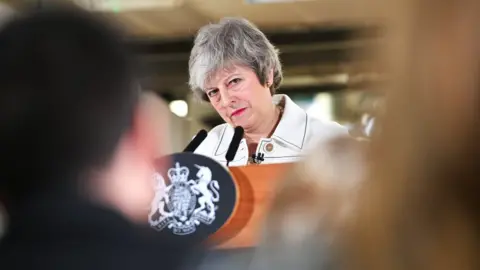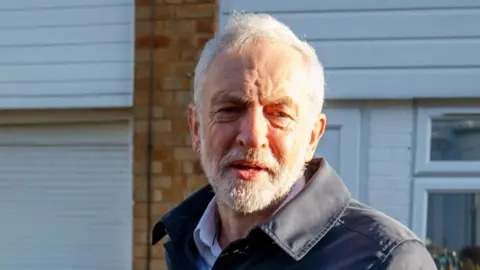The multiple meanings of the vote
 PA
PAForget what might happen when the tellers read out the numbers on Tuesday night, let's think about what's at stake.
With Brexit, it's nearly always subjective, but according to MPs and ministers of different flavours, these are some of the factors that matter and that the result might influence.
Disagree at will of course - you may read these and scoff, or you may even have your own.
But the meaningful vote may well end up having multiple meanings...
1) Let's start with the least likely outcome. A miracle could take place overnight and scores of MPs might suddenly find themselves swinging behind the prime minister's plan.
The vote goes through, she shouts hurray, and the process moves on smoothly.
We leave the EU as planned in less than three months, and Theresa May's place in history is secure (no laughing at the back).
2) The defeat is disastrous and a combination of pressure from some ministers and MPs forces the PM to reach across the aisle.
Depending on the scale of the defeat, and the reaction of Labour front and backbenchers, Westminster might be ushered into a different phase of bargaining across the benches.
One Labour MP told me today: "At some stage I will vote for the deal, but I will need something specific to show for it. We are about to enter an era of transactional politics."
Cross-party working may not be some kind of high-minded pursuit.
 PA
PA3) The scale of the likely loss might prompt the kind of parliamentary takeover that's been much discussed in the last couple of days.
Arguably this might be one of the most long-lasting impacts.
Rewriting the parliamentary rulebook may inevitably be largely of interest to nerds like me, but the kind of suggestions these extraordinary times are prompting might reshape the relationship between the government and MPs for years to come - and that matters.
4) Given that the balance in Parliament is definitely for a softer Brexit with closer ties to the EU, (arguably) the defeat on Tuesday might lead to a less dramatic break with the EU than the deal on the table promises.
One member of the cabinet tonight told me: "The longer this goes on, the softer Brexit gets."
Before you scream, I know that is not a view that is shared universally. But it is sincerely held by plenty of people around the place who point rather frustratedly to the irony.
As another member of cabinet said: "The hardline Brexiteers will push us toward a softer Brexit by digging in their resistance."
5) Technically speaking, if you don't assume (and assumptions are dangerous) that Parliament can and would block no deal, the rejection of the plan would move us closer to leaving without a deal.
That's not just because Eurosceptics are showing very little sign of budging, but remember the process is on a clock.
Article 50 has to come to a conclusion by the end of March and, as the law currently stands, we are leaving with or without an agreement.
Some other ministers in the cabinet believe very firmly once the vote is lost the PM has not much choice other than to up no-deal prep again in the hope, not of going that way, but of trying for another EU concession.
One told me it is the "only logical conclusion" to keep going steadily and hope the EU will break - a continuation of the high-stakes poker game.
6) Jeremy Corbyn will either delight or disappoint his ranks by having the bottle to force a confidence vote, or delaying again, waiting for a magic moment.
But he seems unlikely to take the bold step many of his members want and to move to offering another referendum.
 AFP/Getty Images
AFP/Getty Images7) For those campaigning for another European referendum, too, the scale of the defeat, and Tuesday night's front bench responses to it, are vital.
The outcome of the vote will affect whether we leave the EU on time, and less likely, whether we could be given another say on whether we leave at all.
And when those truths eventually reveal themselves, they in turn could have an impact on the fabric of the UK itself.
What happens in Northern Ireland, or to the case for Scottish independence, are part of what is at stake in the long term.
8) Lastly, after more than two years of endless discussions, as and when the vote goes down on this hard-fought compromise, Westminster's factions and rival camps might finally have to do more than talk amongst themselves, and actually bend or break.
The divisions are so intense in both the main political parties that it could also be the moment some of the divisions turn into real splits.
That really would be history happening in front of our eyes.
